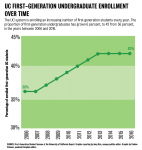For first-generation UCLA student Aaron Lopez, talking to his family about college is a challenge.
Lopez, a fourth-year English and gender studies student, said as the first person in his family to go to college, he often felt he had to navigate college alone without much family support.
“My grandmother is my only family and she does not quite understand what UCLA means – she cannot differentiate UCLA from high school,” Lopez said. “How can you communicate with your family when they don’t know the struggles of an institution like UCLA?”
In an effort to address challenges that first-generation students like Lopez face, the University of California announced the start of a new initiative in August to provide them with mentorship opportunities.
The systemwide FirstGen initiative facilitates mentorships between first-generation students and first-generation faculty, said UC Student Regent Paul Monge, who is also a first-generation student.
As part of the initiative, about 900 faculty members across the UC system will wear T-shirts identifying themselves as the first in their families to graduate college during the first few days of school. Monge said this will create a sense of belonging for first-generation students and will distinguish faculty members with the T-shirts as potential mentors.
In addition to FirstGen, the UC launched a website to connect current and prospective first-generation students with resources, including scholarships and financial services, opportunities to study abroad and community-building programs. The website also features profiles of campus leaders, such as chancellors, who were first-generation students.
“The UC’s FirstGen initiative will be critical in helping students like myself overcome gaps in information and resources that we often experience as the first person in our families to receive a college education,” Monge said.
Abigail Edwards, a third-year civil engineering student who is also a first-generation student, said she thinks navigating college can be challenging without being able to ask family members for help.
“Financial aid was difficult (because) I had to figure that out on my own, as my mother doesn’t know anything about the process and English is not her first language,” Edwards said. “She would ask me how much aid I was receiving and how I could obtain more – these questions were difficult to answer because I did not know.”
Edwards added she thinks the FirstGen initiative is important because first-generation students may struggle to find the right resources, while also facing pressure from their families to succeed and do well in school.
FirstGen will complement other programs that support first-generation students on UC campuses.
For example, in the fall, UCLA will launch the First to Go Living Learning Community, a new themed floor for first-generation students, in Hedrick Hall.
Symone Morales, a First to Go program coordinator, said the community is part of the First to Go initiative, which UCLA launched in 2016 to give first-generation students a sense of community and to provide them with networking opportunities.
First-generation students who opt to live on the floor will have the opportunity to develop relationships with other first-generation students, Morales said.
They will also be able to access resources for first-generation students, such as through the Scholarship Resource Center and the UCLA Career Center, she added. Monge said he thinks initiatives like FirstGen are increasingly important because 40 percent of UC students are first-generation.
Lopez, who had once dropped out of middle school, said he never expected to go back to school or to graduate from UCLA.
“First-generation students might not be able to talk to their families about college, but (these initiatives) will be an excellent opportunity for them to get to know others like them and have someone that they can talk to,” Lopez said. “If you are a first-generation student, you are already doing something great.”
